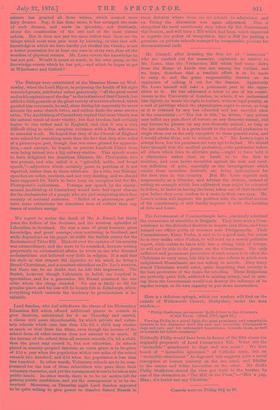The Bishops were entertained at the Mansion House on Wed-
nesday, when the Lord Mayor, in proposing the health of his right reverend guests, attributed rather generously, " all the great moral and noble aspirations of the day" to the initiative of that Church, but added a little grumble at the great variety of services allowed, which puzzled him verymuch, he said, since during his mayoralty he never attends the same church twice, and seldom finds the same service twice. The Archbishop of Canterbury replied that more liberty was the natural result of more vitality, but that freedom had certainly begun to run rather mad in England, and that it was a very difficult thing to unite complete tolerance with a firm adherence to essential truth. He hoped that they of the Church of England were valued for something more than the fact that they were relics of a picturesque past, though that was some ground for apprecia- tion,—and enough, he hoped, to prevent Lambeth Palace from ever being turned into a big railway-station. This speech seems to have delighted the American Minister, Mr. Pierrepoint, who was present, and who called it a "splendid, noble, and broad speech,"—adjectives which certainly point to portions of it not reported, rather than to those which are. As a rule, our Bishops' speeches are sober, cautious, and not very dazzling, and we should have supposed Dr. Tait's to have been no exception but for Mr. Pierrepoint's enthusiasm. Perhaps any speech by the ninety- second Archbishop of Canterbury would have had equal charms for the Ambassador of a people who are just completing their first century of national existence. "Relics of a picturesque past" have more attractions for American men of culture than any traces of modern energy.






























 Previous page
Previous page